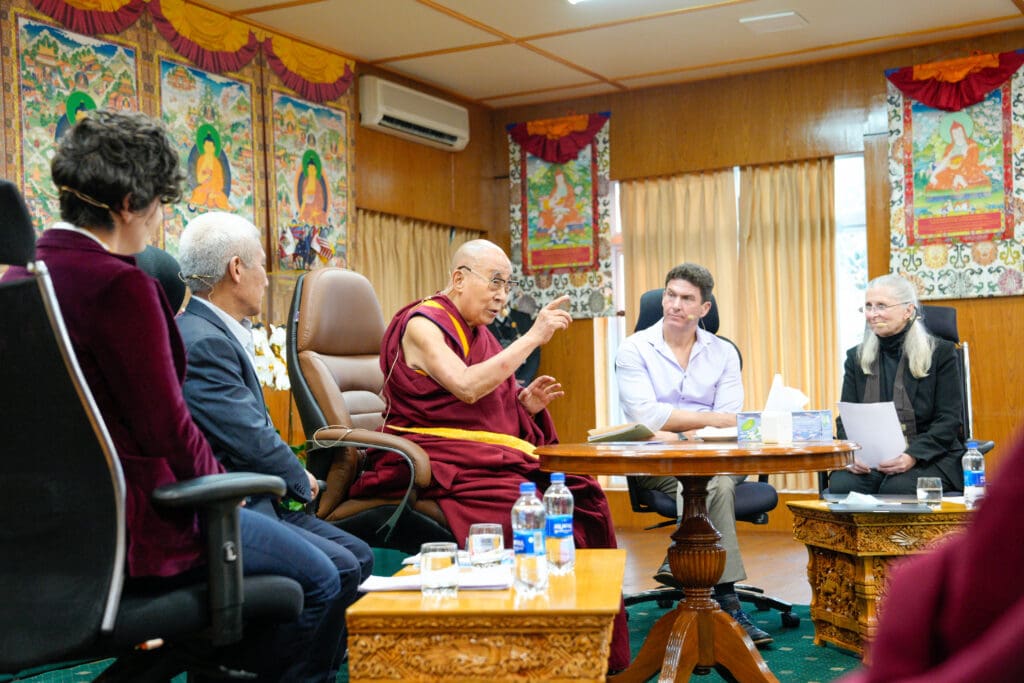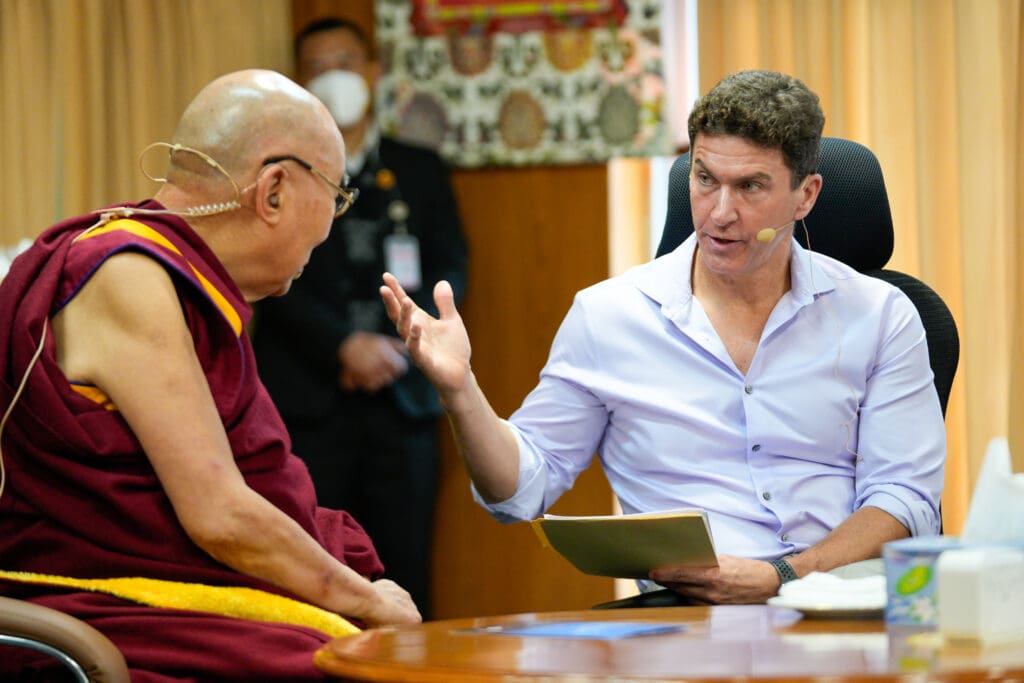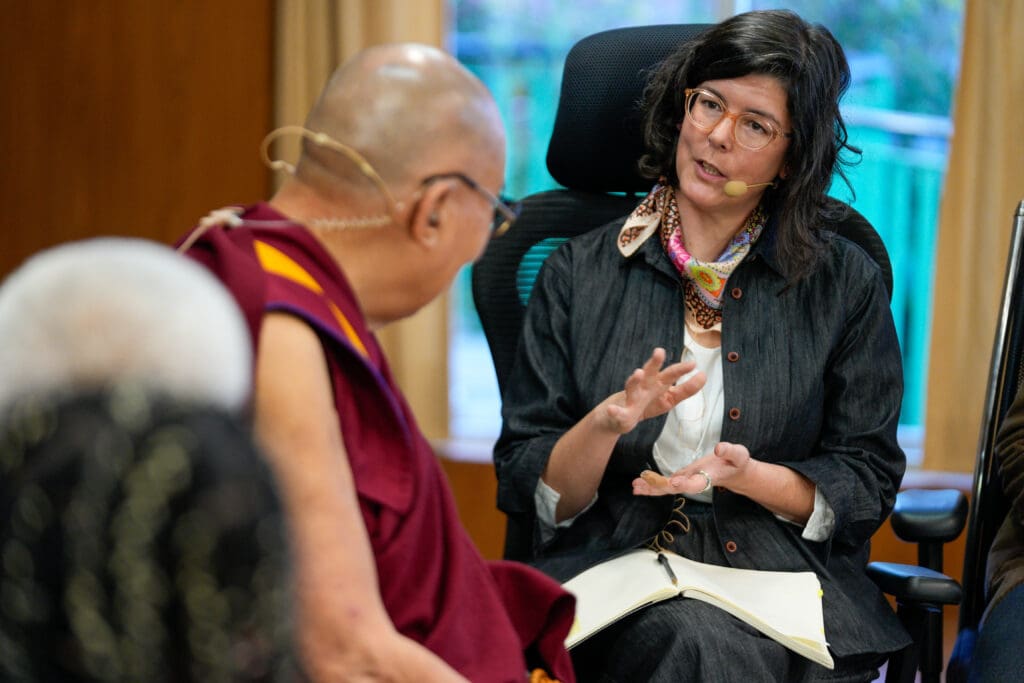
Mind & Life periodically invites guest writers to contribute their perspectives and experiences on the blog as a way of deepening dialogue and understanding around key themes related to our mission.
“We live through our mind and mental experiences, and to live well in this world is to have peace of mind,” said His Holiness the Dalai Lama in welcoming invited guests to his residence in Dharamsala, India for a recent “Conversation on Interdependence, Ethics, and Social Networks” sponsored by the Mind & Life Institute and Mind & Life Europe. “The root of this peace of mind is compassion,” he added.
The Dalai Lama’s words carried a message of clarity and kindness familiar to many of us in the room, as though it was imprinted on our hearts. The weeklong gathering, in this 35th anniversary year of Mind and Life, felt like a reunion. Among those present were elders of this community who paved the way scientifically and experientially for the enactive exploration of consciousness; lead authors of key contemplative science papers; esteemed meditation masters; and heroes of compassion using their energy to improve peace of mind for all beings. They exemplified what Mind & Life co-founder Francisco Varela so intently hoped for—to develop ‘practitioner scientists,’ moving beyond the limits of contemporary scientific method to understand through embodying the practices under investigation, creating new frames and stories for our hearts and minds.
The week centered around two sessions in which four researchers presented their work to the Dalai Lama, including evolutionary biologist Joseph Henrich, psychologist Molly Crockett, philosopher Hanne de Jaegher, and cognitive scientist Abeba Birhane. Each shared concern over the powerful influence that social and cultural stories are having on contemporary society, especially when these run contrary to an ideal view of our essential sameness as brothers and sisters to whom we should extend our care. Throughout, the Dalai Lama invited us to see beyond the confines of our separateness, and to engage with the warm-hearted potential we all share. Each scientist pointed to the reality and importance of our differences in creating that feeling of kinship. Holding both is clearly an essential task in our divided world.
…the Dalai Lama invited us to see beyond the confines of our separateness,
and to engage with the warm-hearted potential we all share.
On the first day, Joseph Henrich shared wisdom from his many-decade career studying how the last 12,000 years of evolution reveal how culture shapes our societies, bodies, and views. He proposed exploring the possibility of creating a global identity, one which highlights the shared humanistic values of interdependence and altruism.

Molly Crockett, whose work bridges cognitive and developmental approaches with behavioral economics and philosophy, posed why many in our world continue to view humanity as ‘selfish’ when data, and our own first-person experience, reveal that generosity and altruism are part of our true nature. This view of selfishness is a ‘story crisis,’ she said, that undermines and limits how we view ourselves and each other. The Dalai Lama reminded attendees that the true story of who we are is kind and warm-hearted, and that we need to educate people about this truth, and regain a childlike warmth and openness to the world. Molly’s research on “moral outrage,” which combines collective feelings of anger and disgust, often online, sparked a question about whether there is ever a utility of anger, a theme that has woven itself through decades of Mind & Life Dialogues. His Holiness shared that with the intention of well-being, anger can enact boundaries and even be used to educate.
The second day opened with his Holiness offering a beautiful reflection on his practices and path. He shared that while his body is aging, his mind and heart are becoming younger through the practice of compassion. Through daily practice, he described connecting with the luminous nature of clear light awareness at the center of consciousness. These comments highlight an experiential knowing of the transformative potential of these ancient practices beyond any current method of scientific examination, yet were nonetheless palpable to many of us in the room.

Hanne De Jaegher went on to share her elegant work exploring the interpersonal in our cognition, arguing that our sensory knowing of the world is bound to our relational experience and, thus, our knowing can be like loving. In her participatory sense-making model, we co-create our reality through our experiences with others in the world around us, not just as individuals. This includes our shared development of language, which shifts how we see the world.
Abeba Birhane, whose work focuses on artificial intelligence (AI), presented her concerns over the misuse of AI, which often fails to consider the dynamic aspects of human behavior, along with the hazards of AI research, which often lacks adequate human values. The Dalai Lama shared that technology should serve human values, and that we should not be slaves to our machines. Unfortunately, he cautioned, materialist values fail to prioritize our deepest human needs for peace and compassion.
In addition to the formal dialogues, there were countless spontaneous conversations throughout the event between guests around breakfast and lunch tables, in the back of taxi rides, and while navigating bustling streets. Topics ranged from how to increase the diversity of populations studied in scientific papers to how to study subtle body practices, and from how contemplative science can meet climate distress to promoting the good in technology.
This event was deeply meaningful to attendees for many reasons. My own trace back twenty-two years ago, when I was in my second year of college and got to attend the 2000 Mind & Life Dialogue on Destructive Emotions as an observer with my dad, pioneering emotion psychologist, Paul Ekman. I could not have known that the trip would forever change his life and my own. My dad was not an easy choice for the meeting. While a leading world expert in emotion, he was known for being passionate in his belief in the dominance of science for knowing the world and had shown no spark of interest in the spiritual. As he describes it, at the time he believed the Dalai Lama was another fad or hype figure like many that emerged in the Bay Area in the 1970s. However, the scientific insights and reflections of the Dalai Lama opened my dad up to new types of inquiry on the mind, consciousness, and, most importantly, strategies for how to work with our emotions. His exchange with the Dalai Lama elicited a type of healing through a connection he had never known possible and couldn’t explain by any method of science. From that meeting, a curriculum for working with challenging emotions, Cultivating Emotional Balance, emerged and has been the foundation of my own research and training for over 13 years.
Needless to say, returning to the dialogue context with the Dalai Lama was a reminder of how essential it is to tend and foster spaces where new ideas and meaningful disagreements may arise. One noteworthy tension that emerged from the dialogue was how to focus on what we all share–our common humanity–while understanding and appreciating what makes us different as individuals belonging to diverse cultures and belief systems. Another essential feature was time given for the precious medicine of social connection. In five years, we may trace new ideas and collaborations back to conversations that emerged from this Himalayan seed.
Leaving Dharamsala, I felt more connected to my own dedication to this work and community. May we all seek and develop peace of mind in the face of the suffering and remember, as the Dalai Lama reminded us, that together, “we are brothers and sisters of one humanity.”
Eve Ekman PhD, MSW is a contemplative social scientist designing, delivering, and evaluating tools to support emotional awareness in the fields of health care, and more recently through technology.
The video recordings from this event will be available with the launch of our new digital dialogue library in early 2023. Subscribe to our newsletter for updates.

